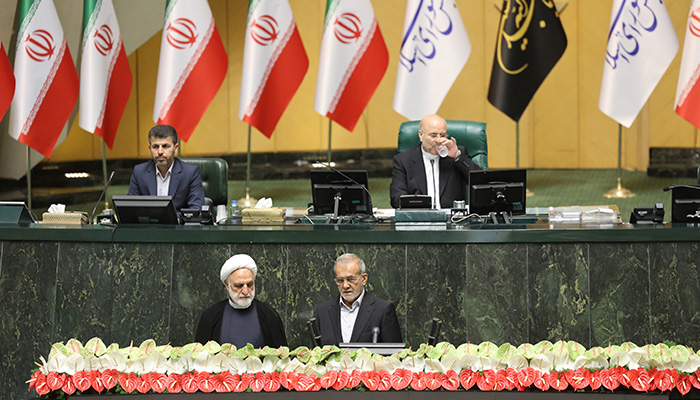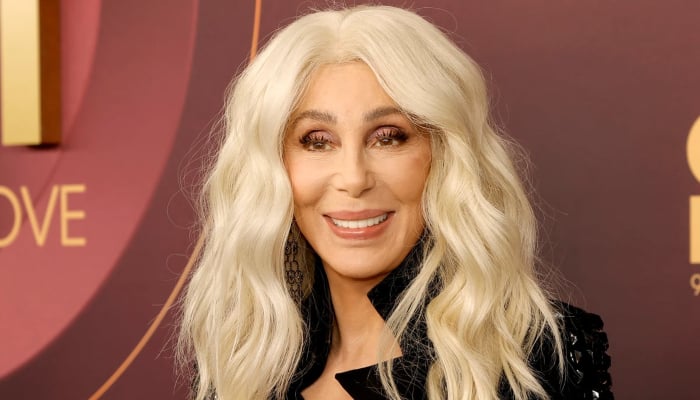

- Pezeshkian becomes 9th president of Iran after winning July 5 runoff.
- Over 70 foreign delegates attend Pesezshkian's swearing-in ceremony.
- Iranian supreme leader endorsed new president two days ago.
Masoud Pezeshkian has taken oath as the new Iranian president in an ceremony that took place at the Iran's parliament on Tuesday.
Pezeshkian was the 9th president in the history of Iran who took the oath of office during the ceremony that began at 16:00 local time in the main hall of the Iranian parliament in Tehran today.
More than 70 foreign delegates, including senior officials and secretary generals of regional and international bodies, attended Iran's President Pezeshkian’s swearing-in ceremony, according to the state broadcaster.
Leader of the Islamic Revolution Ayatollah Seyyed Ali Khamenei formally endorsed Masoud Pezeshkian as Iran’s new president on Sunday who won the July 5 runoff.
He emerged victorious in the second round of the presidential election on July 5 defeating former nuclear negotiator Saeed Jalili, garnering 53.7% of the vote, while Jalili received 44.3%, according to final results announced by the Interior Ministry.
The snap election was called shortly after President Ebrahim Raeisi lost his life in a tragic helicopter crash in May.
According to Mojtaba Yousefi, a member of the parliament’s presiding board, the president will have 15 days to present his proposed ministers to the parliament for a vote of confidence.
As per parliamentary rules, Pezeshkian will officially renounce his lawmaker mandate on July 31, Yousefi added.
Iran's presidential election took place against a backdrop of heightened regional tensions since the Gaza war began in early October, disputes with Western powers over Iran's nuclear programme and domestic discontent over the state of the sanctions-hit economy.
Tuesday's ceremony was attended by senior officials from several countries including Armenia, Tajikistan, Egypt, Sudan, Iraq, Turkey, Saudi Arabia, Azerbaijan, Cuba and Brazil.
European Union envoy Enrique Mora was also present.
Regional Iran-backed allies were also in attendance, namely Hamas leader Ismail Haniyeh and the head of the Islamic Jihad Ziyad al-Nakhalah.
Lebanon's Hezbollah movement was represented by the group's deputy secretary general Naim Qassem while the Yemen's Houthi rebels sent spokesman Mohammed Abdulsalam.
'Death to Israel'
Haniyeh and Nakhalah, whose groups have been fighting Israel in the Gaza Strip since Hamas's October 7 attack on Israel, met with Khamenei and Pezeshkian.
"Supporting the cause of the oppressed Palestinian nation will continue with strength, and no factor can disrupt our will in this direction," said Pezeshkian in a Monday statement.
Tuesday's swearing-in ceremony came amid concerns of war between Israel and Lebanon's Hezbollah following a rocket attack from Lebanon Saturday on the Israeli-occupied Golan Heights.
Israel has accused Hezbollah of responsibility for the attack that killed 12 children but the Iran-backed Lebanese group has denied any involvement.
During the ceremony, parliament speaker Mohammad Bagher Ghalibaf gave a speech lambasting what he called Israel's "crimes" in Gaza.
Some Iranians present in parliament chanted: "Death to Israel, Death to America."
Iran has made support for the Palestinian cause a centrepiece of its foreign policy since the 1979 Islamic revolution, and hailed Hamas' October 7 attack on Israel.
Iran's president is not head of state, and the ultimate authority rests with the supreme leader — a post held by Khamenei for the last 35 years.
On Monday, Pezeshkian warned Israel against attacking Lebanon, saying such an act would have "heavy consequences".
Since his election, Iran's new president has reaffirmed support for the "axis of resistance", Tehran-aligned groups such as Hezbollah and the Houthis, that support Hamas against arch-foe Israel.
Pezeshkian was the only candidate representing Iran's reformist camp allowed to stand in Iran's presidential election, for which all contenders were approved by the conservative-dominated Guardian Council.
During his campaign, the former health minister, had vowed to try and revive a 2015 nuclear deal with world powers which collapsed in 2018 after the United States unilaterally withdrew from agreement.
The deal had given Iran sanctions relief in return for curbs on its nuclear activity.
Pezeshkian has recently called for "constructive relations" with European countries, even though he accused them of reneging on commitments to mitigate the impact of renewed US sanctions.












